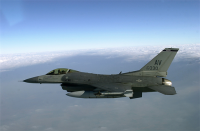-
How to protect nuclear plants from terrorists

In the wake of terrorist attacks in Brussels, Paris, Istanbul, Ankara, and elsewhere, nations are rethinking many aspects of domestic security. Nuclear plants, as experts have long known, are potential targets for terrorists, either for sabotage or efforts to steal nuclear materials. At last month’s Nuclear Security Summit in Washington, D.C., representatives from fifty-two countries pledged to continue improving their nuclear security and adopted action plans to work together and through international agencies. But significant countries like Russia and Pakistan are not participating. And many in Europe are just beginning to consider physical security measures. To prevent an attack at a nuclear site, governments must take security at nuclear sites seriously now, not a year from now. In light of the current terrorist threat and with four Nuclear Security Summits completed, countries with nuclear plants need to up their game with regards to physical security at nuclear power facilities before it’s too late.
-
-
Section of 9/11 Commission report linking Saudi Arabia to 9/11 attacks may be declassified
The 9/11 Commission interviewed hundreds of witnesses and compiled a report of more than 800 pages. The report’s last chapter of the report, however, has been classified for the last thirteen years. The White House said that within the next sixty days it will decide whether or not declassify the 28-page chapter. Those familiar with the contents of the classified document indicate that it would reveal a Saudi Arabia-based support network which helped the hijackers 9/11 in the United States.
-
-
2015 was the most lethal year for terrorism in Europe in a decade
2015 was the most lethal year for terrorist violence in Europe in nearly a decade, as terrorists increasingly target private citizens and public gatherings. This marks the first net increase in global terrorism risk ratings since 2013, with the risk ratings of eighteen countries experiencing an increase and thirteen countries seeing a decrease. Shootings overtake bombings in the Western world for the first time since 2007, with terrorists targeting private citizens and public gatherings.
-
-
Latest European Terror Threat Snapshot released
Representative Michael McCaul (R-Texas), chairman of the House Homeland Security Committee, has the other day released the latest European Terror Threat Snapshot. The product is a periodic Committee assessment of the Islamist terror threat environment across Europe. It supplements the Committee’s monthly Terror Threat Snapshot which examines the broader Islamist terror threat the United States, the West, and the world.
-
-
Boko Haram robs children in northeast Nigeria of education
Boko Haram’s attacks on schools, students, and teachers in northeast Nigeria have had a devastating impact on education. Between 2009 and 2015, Boko Haram’s attacks destroyed more than 910 schools and forced at least 1,500 more to close. At least 611 teachers have been deliberately killed and another 19,000 forced to flee. The conflict has left nearly one million children with little or no access to school, and Nigeria’s security forces have contributed to the problem by using schools as military bases, putting children at further risk of attack from the Islamist armed group.
-
-
Non-state actors exploiting emerging technologies, complex engineering
In a special issue of the Journal of Strategic Security, experts explore the threat of violent non-state actors (VNSAs) exploiting emerging technologies and executing complex engineering operations to facilitate their violent and criminal activities. The special issue of the journal presents the results of a series of case studies of VNSAs and their attempts to increase their capabilities through engaging in sophisticated engineering efforts.
-
-
FARC’s development of narco-submarines
The Revolutionary Armed Forces of Colombia (FARC) and the Colombian government are in the final stages of negotiating an end to the leftist insurgency in Colombia, but over the last forty years, FARC has proven to be one of the most formidable non-state actors in the world. Showing sophistication and adaptability, the group has upgraded its former methods of drug transportation in favor of a more covert alternative. The development of semi-submersible vessels by FARC highlights the group’s capabilities to engage in highly complex engineering tasks, facilitating drug trafficking across the South and Central American coasts.
-
-
Arab youths reject ISIS, say effort to establish Islamic State will fail

Arab youth say the rise of ISIS remains the single biggest challenge facing the Middle East, but young people in the region overwhelmingly reject the extremist group and believe it will fail to establish an Islamic state. That is the headline finding of the eighth annual ASDA’A Burson-Marsteller Arab Youth Survey, released the other day. ASDA says that while three in four Arab youth are concerned about the rise of ISIS, just one in six believes the terrorist group ultimately will succeed.
-
-
10-fold increase in number of children Boko Haram uses in suicide attacks
The number of children involved in ‘suicide’ attacks in Nigeria, Cameroon, Chad, and Niger has risen sharply over the past year, from four in 2014 to forty-four in 2015, according to a UNICEF report released yesterday. More than 75 percent of the children involved in the attacks are girls.
-
-
Boko Haram willing to release kidnapped girls for $56 million ransom
Boko Haram has said it was demanding a ransom of nearly $56 million for the release of the 219 schoolgirls it kidnapped from the Nigerian town of Chibok two years ago. The Islamist militants conveyed their demand in secret contacts with the government of President Muhammadu Buhari, who, during last year’s presidential campaign, said that if need be, he would negotiate with the militants for the girls’ release.
-
-
Overwhelming majority of British Muslims reject suicide bombers, terrorism: Survey

An in-depth survey found that 96 percent of British Muslims do not sympathize with radical Muslims who take part in suicide bomb attacks. The vast majority of those surveyed show similar levels of support to the wider British public in support for British institutions and a feeling of belonging to Britain. On some social and cultural issues, however, a large number of British Muslims are out of step with the wider population.
-
-
Four questions Belgians should ask about the Patriot Act

The Paris and Brussels terrorist attacks added a sense of urgency to calls for Belgium to enact its own counterterrorism bill. It is a call the French government has already answered. Increased use of surveillance is a worldwide trend. There is no guarantee, however, that even with the most sophisticated surveillance technology out there today, passing a bill or law to collect private information on citizens will protect us from terrorist threats and violence. Even more vexing: the nature of intelligence gathering means we may never know exactly how many attacks have been prevented by the Patriot Act, the French surveillance law — or a similar law that Belgium may soon pass.
-
-
U.S. more likely to use force in a military dispute when the president is a Southerner
The United States is more likely to use force in a military dispute when the president is a Southerner, according to a new study. The study argues that “Southern honor” — an ethical code that emphasizes a reputation for resolve — pervasively shapes Southern presidents’ approach to disputes with other nations, making those presidents less willing than their peers from northern states to back down during international disputes. Consequently, Southern presidents have been more likely to use military force, resist withdrawal, and ultimately achieve victory, the study finds.
-
-
Cannibal al-Nusra commander killed by rival Islamist militia

Khaled al-Hamad, otherwise known as Abu Sakkar, a senior commander of the al-Qaeda-affiliated al-Nusra Front who was filmed eating an organ of a dead Syrian government soldier, has been killed by gunmen near the Turkish border, al-Nusra has announced. Al-Hamad gained notoriety for the shocking video which surfaced in 2013, and which, for many, captured the brutality of the Syrian civil war. The cannibalism scene captured on video showed al-Hamad eating either the heart, lung, or liver of the dead soldier.
-
-
U.S. strike kills senior al-Nusra official – an al Qaeda “legacy” leader

A Pentagon spokesman said that the targets of a U.S. airstrike in northwestern Syria that were several top leaders of the al Qaeda-affiliated al-Nusra Front, including the group’s spokesman Abu Firas al-Suri. Al-Suri, a Syrian national, served in the Syrian military before being forced out for Islamist leanings. He became close to bin Laden while fighting in Afghanistan, and rose to a senior position in al Qaeda in the late 1980s.
-
More headlines
The long view
How Male Grievance Fuels Radicalization and Extremist Violence
Social extremism is evolving in reach and form. While traditional racial supremacy ideologies remain, contemporary movements are now often fueled by something more personal and emotionally resonant: male grievance.
